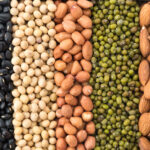For individuals with allergies or dietary restrictions, navigating the dairy aisle can be a daunting task.
In this guide, well explore some popular milk substitutes and help you make informed choices.
Soy milk is one of the most common milk alternatives.

Made from soybeans, it has a creamy texture and a slightly nutty flavour.
However, if you have a soy allergy, this may not be the best option for you.
Almond milk is a popular choice among those with dairy allergies.

It is made by blending almonds with water and then straining the mixture to remove the solids.
However, if you have a nut allergy, you should avoid almond milk.
Coconut milk is derived from the flesh of mature coconuts.

It has a rich, creamy texture and a distinct tropical flavour.
However, it is higher in calories compared to other milk alternatives.
Oat milk is gaining popularity as a dairy alternative.
Made from oats and water, it has a mild, slightly sweet taste.
It is also a good source of fiber and can be used in beverages, cereals, and recipes.
Rice milk is made from milled rice and water.
It has a thin and watery consistency with a naturally sweet taste.
Rice milk is hypoallergenic, meaning it is unlikely to cause allergic reactions and is well-tolerated by most people.
However, it is lower in protein and other nutrients compared to cows milk or other milk alternatives.
It can be a suitable choice for those with multiple allergies or sensitivities.
Hemp milk is made from ground hemp seeds mixed with water.
It has a slightly nutty flavor and a creamy texture.
Hemp milk is a good source of omega-3 fatty acids, which are beneficial for heart health.
It is also rich in vitamins and minerals.
However, it may not be suitable for those with a hemp or cannabis allergy.
Pea milk is a relatively new addition to the milk substitute options.
It is made from yellow peas and has a creamy texture and mild flavour.
Pea milk is rich in protein and is often fortified with vitamins and minerals.
It is a good alternative for those with soy, nut, or gluten allergies.
However, individuals with pea allergies should avoid this option.
When choosing a milk substitute, consider your specific allergies or dietary restrictions.
Read ingredient labels carefully to ensure the product does not contain any allergens that you oughta avoid.
Fortified versions of milk substitutes can provide added nutrients like calcium, vitamin D, and B vitamins.
Its important to note that not all milk substitutes are suitable for infants and young children.
Consult with a healthcare professional or a registered dietitian before introducing any milk substitute to an infants diet.
Experiment with different alternatives and discover the ones that work best for you.